E-ZPass toll scam: Warning signs + what to do if you see it
E-ZPass text scams are catching drivers off guard. Don’t let it happen to you. Learn what toll scam warning signs to look out for and see how Norton 360 uses advanced AI to help detect and block even the most convincing scams.

Masked highwaymen from days of yore may be long gone, but that doesn’t mean today’s travelers are totally safe from thieves. Scammers have been known to exploit the legitimacy of the E-ZPass service to prey on drivers by sending convincing phishing texts disguised as E-ZPass toll messages.
Read on to learn more about the E-ZPass toll scam, red flags to watch out for, and what to do if you’re targeted.
What is the E-ZPass toll scam?
The E-ZPass toll scam is a new smishing (SMS phishing) scheme that involves scammers texting targets with claims that they owe unpaid tolls and demanding immediate payment.
E-ZPass is a toll system that services 20 states, primarily in the East, Midwest, and South. Scammers running E-ZPass schemes leverage its well-known name to trick people into handing over money and personal information.
Despite the scam only emerging recently, the FBI’s Internet Crime Complaint Center had received more than 60,000 complaints by March 2025. Reports continue to flood in as attackers impersonate toll collection systems, leading government representatives in New York, Maryland, and Virginia to release official warnings.
How the E-ZPass toll scam works
Here’s how E-ZPass toll scams typically play out:
- The scammer obtains phone numbers: Scammers can access phone number databases through data brokers, data breaches, the dark web, or Telegram.
- The scammer sends a fake text about unpaid tolls: Attackers hope to catch people who frequent specific toll roads and won’t second-guess requests for small fees.
- The scammer directs targets to a fake website: Cybercriminals are currently selling phish kits on Telegram, which enable attackers to operate payment portal websites that appear legitimate. Attackers include a link to this site in their text, hoping to collect small amounts of money, usually less than $10. They may also collect financial and personal information they can use in further fraud.
How to spot an E-ZPass scam
If you receive a text from E-ZPass at all, it’s likely a scam. However, if you’re still unsure or are wondering about how to spot other toll scams, there are several warning signs you can look out for. Threatening language and urgent deadlines, odd URLs, foreign country codes, suspicious sender details, and messages about toll roads you’ve never used are all red flags.
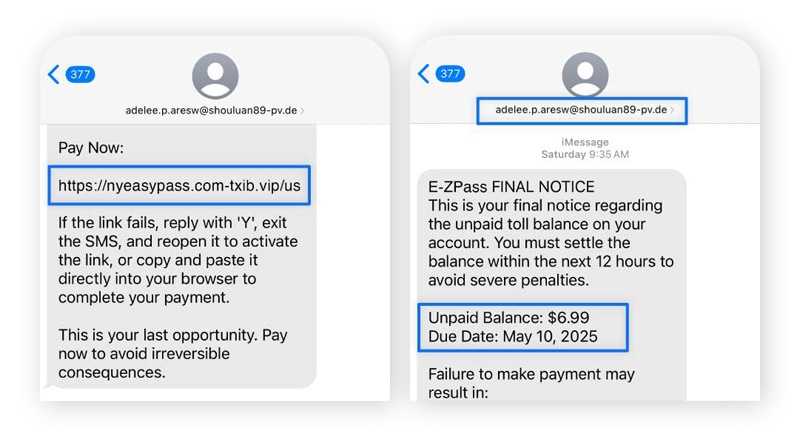

You can also lean on an AI-powered scam detector like Norton Genie to identify suspicious patterns and language that indicate a toll scam. While phishing scams have traditionally featured prominent red flags like spelling errors and strange grammar, today’s fraudsters are leveraging dark AI tools to launch more sophisticated, realistic scam campaigns. Use AI tools to fight AI scams with Norton Genie.
Text from E-ZPass
Receiving a text message from E-ZPass is a red flag in and of itself. E-ZPass never sends unsolicited payment reminders via text. Instead, they post your balance to your personal account, email you, or mail a reminder.
Threatening language and urgent deadlines
Scammers often threaten fines, wage garnishment, or legal consequences like license and vehicle registration suspensions. They may also mention hasty payment deadlines, when E-ZPass typically allows a month or more to pay your balance after taking a toll road. These tactics are designed to trick targets into taking action without thinking, out of fear.
Suspicious URLs
E-ZPass scammers add phishing links to text messages to direct recipients to a malicious website. They may hyperlink the URL or instruct you to paste it into a browser. Attackers often use shortened or slightly altered web addresses that mimic the legitimate E-ZPass site to trick you into clicking and entering your personal or financial information.
Foreign country code
Many E-ZPass scams come from a phone number with a +63 country code, which belongs to the Philippines. However, as this scam gains traction, you may start to see messages sent from various international area codes. Remember that if E-ZPass were to send texts, their number would have a +1 country code, as it’s an American-based organization.
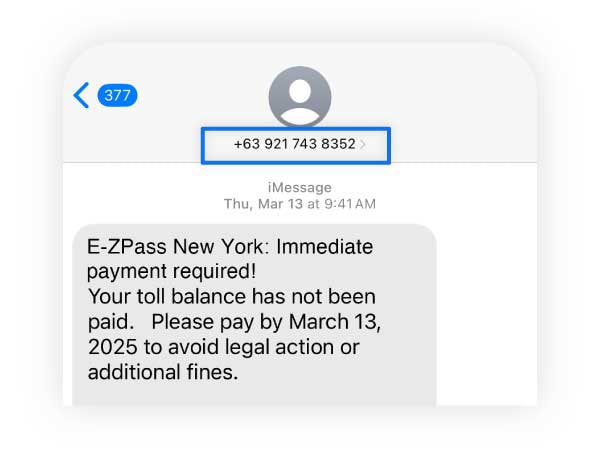

Suspicious email addresses
Scammers often use their personal email to communicate with targets, which should be an immediate red flag. More advanced scammers may use email domains similar to E-ZPass’s to avoid arousing suspicion, so it’s important to look out for subtle differences and take unfamiliar sender warnings seriously.
Locations you’ve never traveled to
Receiving a text message about an unpaid toll from a location you’ve never been to is a strong indicator of an E-ZPass scam. Scammers often employ a “spray and pray” approach to target selection, casting a wide net. This means they may end up texting people who don’t have a toll pass, use toll roads, or even frequent the area.
What to do if you get an E-ZPass scam text
If you receive a suspicious text message claiming you have an unpaid E-ZPass balance, assume it’s a scam and avoid interacting with it directly. Here are the next steps you should take to protect yourself:
- Don’t click the link: If you click on a phishing link, it can trigger a malware download or direct you to fake websites designed to steal your login credentials, personal information, or financial details.
- Don’t reply with personal information: Legitimate toll collecting agencies will never request sensitive personal information like your Social Security number, bank account details, or E-ZPass account password via text message.
- Independently confirm if you owe money: If you have an E-ZPass account and are concerned about a potential missed toll, visit the official E-ZPass website for your state or call their customer service line.
- Block the number: After receiving a scam text, block the sender’s number on your phone to prevent them from sending you further fraudulent messages. You can also adjust your settings to prevent more spam texts from coming through.
- Report the scam: You can report the scam text to the Federal Trade Commission (FTC) at ReportFraud.ftc.gov. Also, consider reporting it to your state’s consumer protection agency.
If you mistakenly clicked on a link and entered any financial information or personal details like your Social Security number, immediately freeze your credit and notify your bank or credit card company.
Check for scams before you pay
Before you interact with any texts from a supposed toll collection group, verify it’s real with Norton 360 Deluxe. Our AI-powered scam detector analyzes messages for suspicious language and patterns, alerting you to threats.
But that’s just the beginning. Norton 360 Deluxe also includes a Privacy Monitor, which can help you find and remove your personal information on risky people-search sites, making it harder for scammers to find and target you in the first place. And, if you do fall for a phishing scam and click an infected phishing link, our state-of-the-art protection tools can help you neutralize malware.
FAQs
Will E-ZPass ever text you?
No, E-ZPass will never send you final reminder texts. Neither will most other toll collection systems, including ExpressToll, TxTag, Pikepass, or Good to Go!
Does E-ZPass send emails to customers?
E-ZPass may email you, but they’ll never request sensitive information or payment details over email.
How do I check if I owe an E-ZPass?
You can check if you owe money by visiting your state’s official E-ZPass website. Here are the links for Delaware, Maryland, New Jersey, New York, and Pennsylvania. Once on the site, look for options to check unpaid tolls. It might say something along the lines of “Manage and pay toll bill” or “Find my tolls.”
Is E-ZPass the only toll scam?
No. While the E-ZPass scam may be a particularly high-profile example, there are many other toll scams. Copycat scammers may also impersonate Peach Pass, TX Tag, FasTrak, ExpressToll, and SunPass. Most use similar tactics to manipulate targets and extort money or information.
E-ZPass is a trademark of the Port Authority of New York and New Jersey.
Editorial note: Our articles provide educational information for you. Our offerings may not cover or protect against every type of crime, fraud, or threat we write about. Our goal is to increase awareness about Cyber Safety. Please review complete Terms during enrollment or setup. Remember that no one can prevent all identity theft or cybercrime, and that LifeLock does not monitor all transactions at all businesses. The Norton and LifeLock brands are part of Gen Digital Inc.
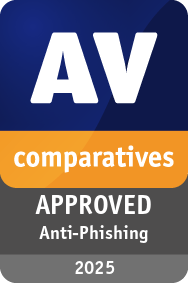


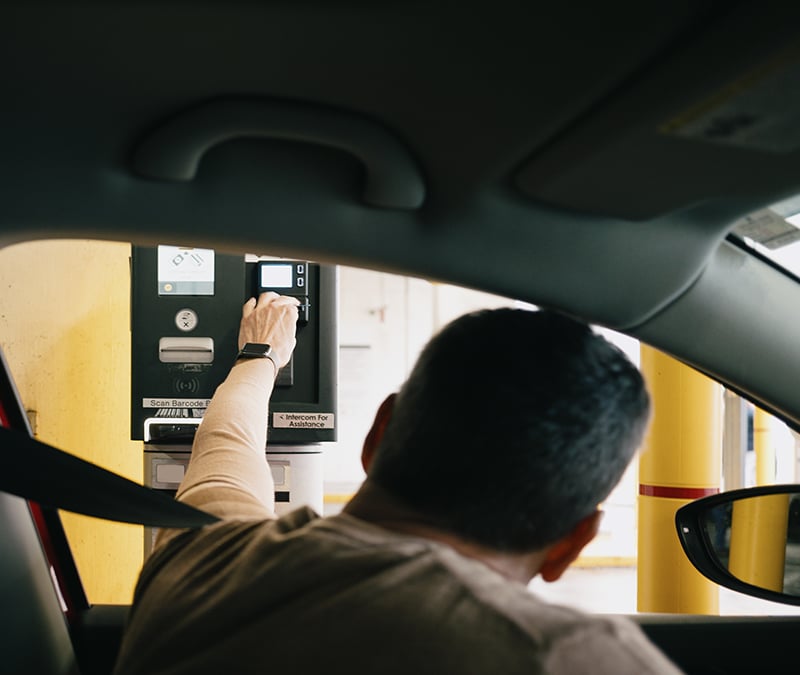

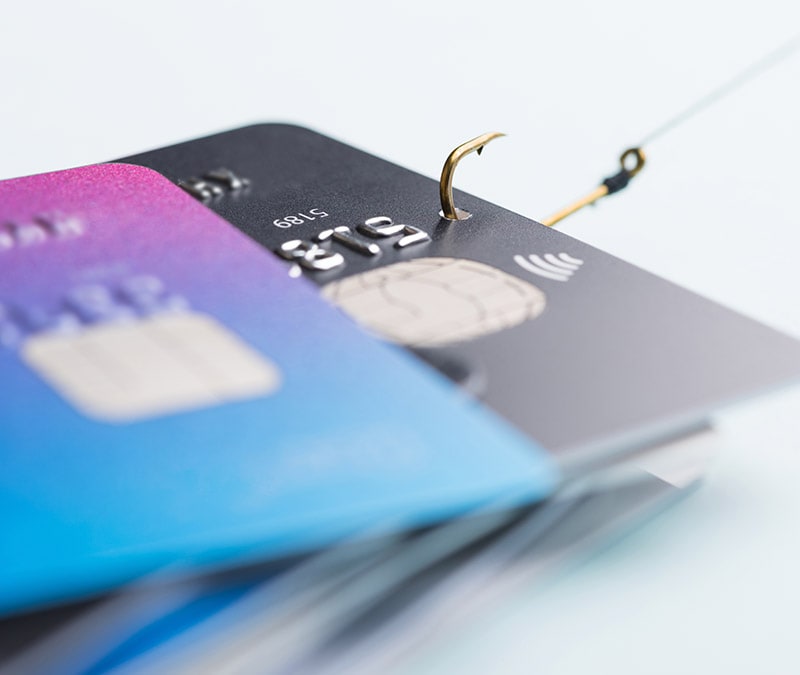



Want more?
Follow us for all the latest news, tips, and updates.